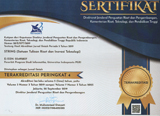Tinjauan Kinerja Supply Chain Management (SCM) pada PT. BJ
(1) Universitas Singaperbangsa Karawang
(2) Universitas Singaperbangsa Karawang
(*) Corresponding Author
Abstract
Keywords
Full Text:
PDFReferences
I. S. Magfiroh and R. Wibowo, “Manajemen Risiko Rantai Pasok Tebu (Studi Kasus di PTPN X) The Supply Chain Risk Management of Sugarcane (Case Study in PTPN X),” J. Pangan, vol. 28, no. 3, pp. 203–212, 2019.
K. Kuncorosidi and I. A. Mugies, “Implementation of Green Supply Chain Management and Mitigation Strategy for Halal Food Management Supply Chain,” TSARWATICA (Islamic Econ. …, vol. 4, pp. 48–64, 2022, [Online]. Available: http://ojs.stiesa.ac.id/index.php/tsarwatica/article/view/1048.
Y. Rohaeni and A. H. Sutawijaya, “Pengembangan Model Konseptual Manajemen Rantai Pasok Halal Studi Kasus Indonesia,” J@ ti Undip J. Tek. Ind., vol. 15, no. 3, pp. 177–188, 2020.
A. Kebutuhan et al., “Analysis of Goods Distribution Requirement Using a Monte Carlo Simulation Approach,” Indones. J. Sci., vol. 3, no. 3, pp. 178–182, 2022, [Online]. Available: http://journal.pusatsains.com/index.php/jsi.
H. Hanafi and D. Soediantono, “Kajian Literatur Hubungan Penerapan Sistem Manajemen Mutu ISO 9001: 2015 Dengan Kinerja operasional dan Organization’s Performance Pada Industri Pertahanan,” J. Ind. Eng. Manag. Res., vol. 3, no. 4, pp. 32–40, 2022.
A. Agustina and M. Mukmin, “Pendampingan Peningkatan Kinerja Umkm Di Masa Pandemi Covid-19 Dan New Normal,” J. Community Empower., vol. 2, no. 1, pp. 37–45, 2023.
A. Azmi and S. S. Admadja, “Analisis Strategi Pemasaran Dan Penjualan E-Commerce Pada Pt Wook Globaltechnology,” J. Econ. BUSINESS, Manag. Account. Soc. Sci., vol. 1, no. 6, pp. 190–199, 2023.
M. Adhan and M. A. Prayogi, “Peranan Kinerja Pegawai: Kepemimpinan dan Motivasi Kerja,” in Seminar Nasional Teknologi Edukasi Sosial dan Humaniora, 2021, vol. 1, no. 1, pp. 260–274.
S. E. Rismawati and S. E. Mattalata, Evaluasi Kinerja: Penilaian Kinerja Atas Dasar Prestasi Kerja Berorientasi Kedepan, vol. 1. Celebes Media Perkasa, 2018.
H. Maret Wijaya, G. Deswantoro, and R. Hidayat, “Analisis Perencanaan Supply Chain Management (Scm) Pada Pt. Kylo Kopi Indonesia,” J. Ekon. Manaj. Sist. Inf., vol. 2, no. 6, pp. 795–806, 2021, doi: 10.31933/jemsi.v2i6.653.
K. B. Putra Permana, “Analisis Peran Supply Chain Management (SCM) Dalam Meningkatkan Kinerja Perusahaan,” COMSERVA J. Penelit. dan Pengabdi. Masy., vol. 3, no. 06, pp. 2275–2287, 2023, doi: 10.59141/comserva.v3i06.1015.
S. P. Puspita, “Analisis Pengaruh Information Sharing dan Trust terhadap Kinerja Supply Chain Management (Studi pada PT Indonesia Nutritional Laboratories Bandung),” J. Ekon. dan Stat. Indones., vol. 1, no. 2, pp. 75–81, 2021, doi: 10.11594/jesi.01.02.04.
D. Maharani et al., “Pengaruh Supply Chain Management Terhadap Operasional Perusahaan Dan Kendala Procurement Sistem Erp Pada Pt Unilever Indonesia Tbk,” Transekonomika Akuntansi, Bisnis dan Keuang., vol. 2, no. 3, pp. 113–126, 2022, doi: 10.55047/transekonomika.v2i3.133.
F. Cuandra, J. Maytanius, Leonardo, D. T. Sembiring, and R. Lim, “Pengaruh Manajemen Rantai Pasok Berbasis Erp Dalam Meningkatkan Kinerja Pt. Furnitur Batam Bina Perkasa,” Transekonomika Akuntansi, Bisnis dan Keuang., vol. 2, no. 4, pp. 55–60, 2022, doi: 10.55047/transekonomika.v2i4.141.
N. Lutfiani, F. P. Oganda, C. Lukita, Q. Aini, and U. Rahardja, “Desain dan metodologi teknologi blockchain untuk monitoring manajemen rantai pasokan makanan yang terdesentralisasi,” InfoTekJar J. Nas. Inform. Dan Teknol. Jar., vol. 5, no. 1, pp. 18–25, 2020.
DOI: http://dx.doi.org/10.30998/string.v8i3.22728
Refbacks
- There are currently no refbacks.
Copyright (c) 2024 Mohamad Aridho, Sutrisno Sutrisno

This work is licensed under a Creative Commons Attribution 4.0 International License.
STRING (Satuan Tulisan Riset dan Inovasi Teknologi) indexed by:

Ciptaan disebarluaskan di bawah Lisensi Creative Commons Atribusi 4.0 Internasional.
Statcounter View My Stats

 Sertifikat Akreditasi
Sertifikat Akreditasi
















